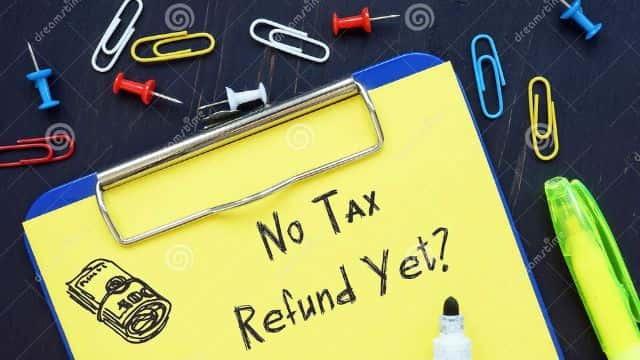Your tax refund most likely arrived in two to three weeks if you filed your return electronically.
The IRS said that it had processed 97 per cent of the more than 145 million tax returns it had received this year as of the end of the spring filing season, issuing slightly more than 96 million refunds.
If you submitted your tax return on paper, it may be included in this widely shared photo of the IRS cafeteria in Austin, Texas:
National Taxpayer Advocate Erin M. Collins made the remark in her most recent report to Congress, adding, “Paper is the IRS’s Kryptonite, and the agency is still buried in it.”
Collins highlighted that as of May, the IRS has 8.2 million tax forms in backlog, which is higher than it was the previous year, and that the processing time for paper returns is lengthening. Yikes.
what is good news? If the IRS owes you money, it must now give you additional interest. The “overpayment” interest rate increased from 4% to 5% as of July 1.
Your 2021 tax overpayment is what caused your tax refund, and the IRS is required to begin paying interest on overpayment 45 days after accepting a tax return.
The Federal Reserve recently decided to boost the federal funds rate, which had an impact on the interest rate. Both the overpayment and underpayment interest rates charged by the IRS are determined by adding 3 percentage points to the federal rate.
What happens if I timely filed my tax return but haven’t received my refund?
There are several reasons why your tax return could not have been processed entirely yet, causing a delayed refund. It’s possible that you included an uncommon form or made mistakes on your return that needed extra processing.
Regardless of the cause, if the IRS does not process your refund within 45 days of receiving your return, it must begin charging interest on the total amount due.
The 45-day window of time begins, whichever comes later, on the day the tax return was due or when the IRS received your “processable” tax return.
The count began on April 18 if you submitted your return electronically on time; if you filed a paper return, it began on the day the IRS acknowledged receipt of your return.
The bad news is that, like interest from a bank or savings account, any IRS interest you get along with your refund will be treated as income and subject to taxation.
When can I expect to receive my tax refund? Refunds for federal taxes are typically sent by the IRS in three weeks. In particular, if your return contains problems, certain taxpayers could have to wait a little longer.
The IRS website states that if a problem holds up the processing of your return, its resolution “depends on how quickly and accurately you answer, and the capacity of IRS staff trained and working under social distancing rules to complete the processing of your return.”
The method you used to file your return affects when you get your tax refund as well.
A further five days may pass before your bank deposits your tax refund if it is deposited directly into your bank account.
This implies that if the IRS needs the whole 21 days to issue your check and your bank needs 5 days to deposit it, you may have to wait a total of 26 days to receive your tax refund.
Due to the lack of a direct deposit waiting period, online services like Venmo and Cash App can deliver your tax refund a few days earlier.
The IRS estimates that if you mailed your tax return, it could take six to eight weeks for your tax refund to arrive once it has been processed.
What may cause a delay in my tax refund?
Read more:-
- Fighting a Tax Increase for the Wealthy Cost Ken Griffin $54 Million. It Paid Off for Him, According to Hidden Irs Data.
- It’s “Offensive” for Her to Play the Victim, Says Ghislaine Maxwell Starz Doc EP
- Four Items to Add to Your Financial Midyear Checklist
Charles P. Retting, the commissioner of the Internal Revenue Service, testified before the House Ways and Means Committee that the IRS received “far more than 10 million returns” last year in which taxpayers failed to correctly reconcile their received stimulus payments with their recovery rebate credit, necessitating a manual review and resolution.
The IRS will notify you if the delay is the result of an essential tax adjustment made to a recovery rebate credit, earned income tax credit, or additional child tax credit claimed on your return.
The IRS will first attempt to proceed without informing you if a problem has to be corrected. It will, however, send you a letter if it requires any additional information.
It will also take longer, the IRS estimates six to eight weeks if you asked for a paper check for your tax refund.


